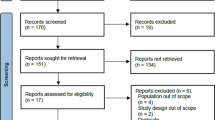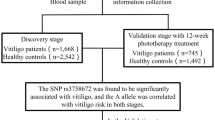Abstract
Psoriasis is a multifactorial skin disease affecting ~2% of world’s population, causing a dramatic decrease in patients’ quality of life and a significant increase in health-care expenses. Biological agents such as the anti-TNFα ones had an enormous impact in patients’ therapy; however, a significant proportion of them do not respond well, an outcome attributed mainly to genetic factors. Recently, in a large European cohort of rheumatoid arthritis patients we have shown association with variation in the receptors that correspond to the Fc portion of the biological agents. As both diseases share common immunological fingerprints, we examined the hypothesis that they share common pharmacogenetic markers. Analysis of FCGR2A-H131R and FCGR3A-V158F polymorphisms in 100 psoriasis patients showed association only with respect to FCGR3A-V158F and response to etanercept (P=0.018). Interestingly, no association was found between FCGR2A-H131R and response to anti-TNFα therapy (P=0.882). This study suggests a role for FCGR3A-V158F polymorphism unique for psoriasis.
This is a preview of subscription content, access via your institution
Access options
Subscribe to this journal
Receive 6 print issues and online access
$259.00 per year
only $43.17 per issue
Buy this article
- Purchase on Springer Link
- Instant access to full article PDF
Prices may be subject to local taxes which are calculated during checkout
Similar content being viewed by others
References
Lowes MA, Bowcock AM, Krueger JG . Pathogenesis and therapy of psoriasis. Nature 2007; 445: 866–873.
Lobo ED, Hansen RJ, Balthasar JP . Antibody pharmacokinetics and pharmacodynamics. J Pharm Sci 2004; 93: 2645–2668.
Vogelpoel LT, Baeten DL, de Jong EC, den Dunnen J . Control of cytokine production by human fc gamma receptors: implications for pathogen defense and autoimmunity. Front Immunol 2015; 24: 79.
Pincetic A, Bournazos S, DiLillo DJ, Maamary J, Wang TT, Dahan R et al. Type I and type II Fc receptors regulate innate and adaptive immunity. Nat Immunol 2014; 15: 707–716.
Highton J, Carlisle B, Palmer DG . Changes in the phenotype of monocytes/macrophages and expression of cytokine mRNA in peripheral blood and synovial fluid of patients with rheumatoid arthritis. Clin Exp Immunol 1995; 102: 541–546.
Shinohara S, Hirohata S, Inoue T, Ito K . Phenotypic analysis of peripheral blood monocytes isolated from patients with rheumatoid arthritis. J Rheumatol 1992; 19: 211–215.
Vasilopoulos Y, Manolika M, Zafiriou E, Sarafidou T, Bagiatis V, Kruger-Krasagaki S et al. Pharmacogenetic analysis of TNF, TNFRSF1A and TNFRSF1B polymorphisms and prediction of response to anti-TNF therapy in psoriasis patients in the Greek population. Mol Diagn Ther 2012; 16: 29–34.
Prieto-Pérez R, Cabaleiro T, Daudén E, Ochoa D, Román M, Abad-Santos F . Pharmacogenetics of topical and systemic treatment of psoriasis. Pharmacogenomics 2013; 14: 1623–1634.
Nimmerjahn F, Ravetch JV . Fcgamma receptors: old friends and new family members. Immunity 2006; 24: 19–28.
Nimmerjahn F, Ravetch JV . Fcgamma receptors as regulators of immune responses. Nat Rev Immunol 2008; 8: 34–47.
Tutuncu Z, Kavanaugh A, Zvaifler N, Corr M, Deutsch R, Boyle D . Fcgamma receptor type IIIA polymorphisms influence treatment outcomes in patients with inflammatory arthritis treated with tumor necrosis factor alpha-blocking agents. Arthritis Rheum 2005; 52: 2693–2696.
Kastbom A, Bratt J, Ernestam S, Lampa J, Padyukov L, Söderkvist P et al. Fcgamma receptor type IIIA genotype and response to tumor necrosis factor alpha-blocking agents in patients with rheumatoid arthritis. Arthritis Rheum 2007; 56: 448–452.
Rooryck C, Barnetche T, Richez C, Laleye A, Arveiler B, Schaeverbeke T . Influence of FCGR3A-V212F and TNFRSF1B-M196R genotypes in patients with rheumatoid arthritis treated with infliximab therapy. Clin Exp Rheumatol 2008; 26: 340–342.
Sarsour K, Greenberg J, Johnston JA, Nelson DR, O'Brien LA, Oddoux C et al. The role of the FcGRIIIa polymorphism in modifying the association between treatment and outcome in patients with rheumatoid arthritis treated with rituximab versus TNF-α antagonist therapies. Clin Exp Rheumatol 2013; 31: 189–194.
Montes A, Perez-Pampin E, Narváez J, Cañete JD, Navarro-Sarabia F . Association of FCGR2A with the response to infliximab treatment of patients with rheumatoid arthritis. Pharmacogenet Genomics 2014; 24: 238–245.
Montes A, Perez-Pampin E, Joven B, Carreira P, Fernández-Nebro A, Del Carmen Ordóñez M et al. FCGR polymorphisms in the treatment of rheumatoid arthritis with Fc-containing TNF inhibitors. Pharmacogenomics 2015; 16: 333–345.
Bowcock AM, Krueger JG . Getting under the skin: the immunogenetics of psoriasis. Nat Rev Immunol 2005; 5: 699–711.
Ryan C, Korman NJ, Gelfand JM, Lim HW, Elmets CA, Feldman SR et al. Research gaps in psoriasis: opportunities for future studies. J Am Acad Dermatol 2014; 70: 146–167.
Su K, Wu J, Edberg JC, McKenzie SE, Kimberly RP . Genomic organization of classical human low-affinity Fcgamma receptor genes. Genes Immun 2002; S1: S51–S56.
Faul F, Erdfelder E, Buchner A, Lang AG . Statistical power analyses using G*Power 3.1: tests for correlation and regression analyses. Behav Res Methods 2009; 41: 1149–1160.
Semble AL, Davis SA, Feldman SR . Safety and tolerability of tumor necrosis factor-α inhibitors in psoriasis: a narrative review. Am J Clin Dermatol 2014; 15: 37–43.
Cheng J, Feldman SR . The cost of biologics for psoriasis is increasing. Drugs Context 2014; 3: 212–266.
Prieto-Pérez R, Cabaleiro T, Daudén E, Abad-Santos F . Gene polymorphisms that can predict response to anti-TNF therapy in patients with psoriasis and related autoimmune diseases. Pharmacogenomics J 2013; 13: 297–305.
Li X, Ptacek TS, Brown EE, Edberg JC . Fcgamma receptors: structure, function and role as genetic risk factors in SLE. Genes Immun 2009; 10: 380–389.
Cañete JD, Suárez B, Hernández MV, Sanmartí R, Rego I, Celis R et al. Influence of variants of Fc gamma receptors IIA and IIIA on the American College of Rheumatology and European League Against Rheumatism responses to anti-tumour necrosis factor alpha therapy in rheumatoid arthritis. Ann Rheum Dis 2009; 68: 1547–1552.
Nishio S, Yamamoto T, Kaneko K, Tanaka-Matsumoto N, Muraoka S et al. Pharmacokinetic study and Fcgamma receptor gene analysis in two patients with rheumatoid arthritis controlled by low-dose infliximab. Mod Rheumatol 2009; 19: 329–333.
Julià M, Guilabert A, Lozano F, Suarez-Casasús B, Moreno N, Carrascosa JM et al. The role of Fcγ receptor polymorphisms in the response to anti–tumor necrosis factor therapy in psoriasis A pharmacogenetic study. JAMA Dermatol 2013; 149: 1033–1039.
van der Pol W, van de Winkel JG . IgG receptor polymorphisms: risk factors for disease. Immunogenetics 1998; 48: 222–232.
Wu J, Edberg JC, Redecha PB, Bansal V, Guyre PM et al. A novel polymorphism of FcgammaRIIIa (CD16) alters receptor function and predisposes to autoimmune disease. J Clin Invest 1997; 100: 1059–1070.
Jani M, Barton A, Ho P . Pharmacogenetics of treatment response in psoriatic arthritis. Curr Rheumatol Rep 2015; 17: 518–527.
Cacabelos R . Epigenomic networking in drug development: from pathogenic mechanisms to pharmacogenomics. Drug Dev Res 2014; 75: 348–365.
Krintel SB, Dehlendorff C, Hetland ML, Hørslev-Petersen K, Andersen KK, Junker P et al. Prediction of treatment response to adalimumab: a double-blind placebo-controlled study of circulating microRNA in patients with early rheumatoid arthritis. Pharmacogenomics J 2015; e-pub ahead of print.
Acknowledgements
We are very grateful to all the participants of the study. This work was supported by the postgraduate program ‘Molecular Biology and Genetics Applications - Diagnostic Markers’ of the Department of Biochemistry and Biotechnology, University of Thessaly, Greece.
Author information
Authors and Affiliations
Corresponding author
Ethics declarations
Competing interests
The authors declare no conflict of interest.
Rights and permissions
About this article
Cite this article
Mendrinou, E., Patsatsi, A., Zafiriou, E. et al. FCGR3A-V158F polymorphism is a disease-specific pharmacogenetic marker for the treatment of psoriasis with Fc-containing TNFα inhibitors. Pharmacogenomics J 17, 237–241 (2017). https://doi.org/10.1038/tpj.2016.16
Received:
Revised:
Accepted:
Published:
Issue Date:
DOI: https://doi.org/10.1038/tpj.2016.16



